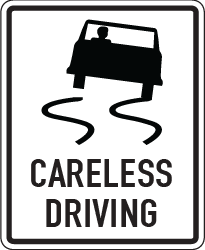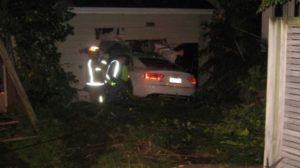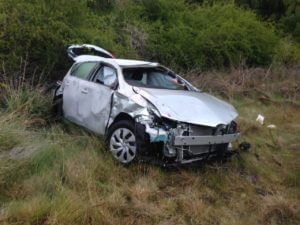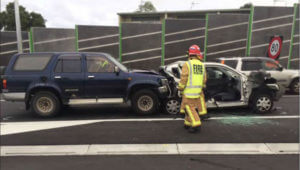Careless, Dangerous & Reckless Driving Lawyer
Contact careless driving lawyer Alistair Haskett on 0800 ROAD LEGAL (0800 762353)
Careless Driving Lawyer Help:

- Careless Driving Explained
- Dangerous Driving Explained
- Reckless Driving Explained
- Penalties for Driver Fault Offences
- Defences to Driver Fault Offences
- Specialist Careless Driving Lawyer
Careless driving lawyer explains careless driving
The test for careless driving is whether the motorist exercised the degree of care and attention that a reasonable and prudent driver would exercise in the circumstances.
That is not a standard of perfection. The law recognises that accidents happen. Sometimes accidents are faultless. Sometimes the other person is at fault. Sometimes fault just can’t be proven. This can be highlighted by reference to a number of comments by judges:
- “The law does not require of any driver that he should exhibit ‘perfect nerve and presence of mind, enabling him to do the best thing possible.’ It does not expect men to be more than ordinary men.”
- “[E]rror of judgment can sometimes involve an action that falls below the standard of the ordinary, reasonable and prudent person, and at other times not.”
- “Accidents can occur even where a driver has exercised the care to be expected of a reasonably competent and prudent driver.”
- “[T]he expectation of “ordinary care” and not a standard of perfection.”
Dangerous driving lawyer explains dangerous driving
The test for dangerous driving is whether in all of the circumstances the driving is or might be dangerous to the public or to a person. This is also an objective test, requiring driver fault and a higher degree of negligence than careless driving such that the driving is dangerous.
Again it is not a standard of perfection and driver fault may not exist or may not be able to be proven.
Whether driving is objectively dangerous can also be a highly contestable issue. It should be assessed against the circumstances at the time, not through the use of hindsight. The focus of the inquiry is on the risks created by the motorist’s manner of driving, not the consequences, such as an accident. As one judge put it, “the court must not leap to its conclusion about the manner of driving based on the consequence”.
Reckless driving lawyer explains reckless driving
The test for reckless driving is whether:
- The driver fell below the standard of care expected of a reasonable and competent driver;
- The resulting situation was objectively dangerous; and
- The driver was aware of the potential danger and continued to act despite knowledge of the possible consequences.
Reckless driving has a higher degree of culpability than careless and dangerous driving, and requires police to prove a specific state of mind. It is again not a standard of perfection and driver fault, dangerousness, knowledge and intentional risk taking or wilful blindness must be proven.
Penalties for careless, dangerous and reckless driving
The maximum penalties for careless, dangerous and reckless driving not involving injury or death are:
- Careless driving has a maximum penalty of a $3,000.00 fine, the court has discretion to disqualify for any period, and 35 demerit points are imposed if there is no disqualification.
- Dangerous driving has a maximum penalty of 3 months imprisonment or a $4,500.00 fine, and the court must disqualify the driver for a minimum of 6 months (unless very limited circumstances apply).
- Reckless driving has the same 3 month and $4,500.00 maximum penalty, as well as the same mandatory minimum period of 6 months disqualification.
The court may impose a different sentence to those above under the Sentencing Act 2002. A conviction for dangerous or reckless driving is a criminal conviction. There are also aggravated offences and increased maximum penalties for these types of offences if they involve excess speed, wrong positioning on the road, or injury or death. There may also be other legal and personal consequences. See our penalties page in our drink drive section about the many possible personal or collateral consequences of a conviction.
If you are charged with any of these offences causing injury or death see the penalties set out in our serious crashes page.
Defences to careless, dangerous and reckless driving charges
There are many ways in which careless, dangerous and reckless driving charges can be defended.
The police must prove the applicable driver fault and type of driving beyond reasonable doubt. That is a high standard of proof and can be very difficult for police to do. Police cannot force a defendant to give evidence.
Often police are working from a theory with little hard evidence. At other times the evidence of prosecution witnesses is insufficient or can be shaken in court. Even where the prosecution evidence is credible and reliable, the police must still prove that defence evidence about lack of fault is not a reasonable possibility. A judge cannot assume driver fault or just choose between witnesses.
Cases can also be won where there is no dispute between witnesses. Not all driver fault is of a culpable kind. An error of judgement can give rise to a defence, such as in some cases where a motorist has fallen asleep, made a mistake or misjudged a situation. Split second or reasonable reactions to driving incidents can also be a defence. The law does not require perfection.
The prosecution can also be required to prove that the driving or accident was not caused by things other than driver fault, such as mechanical failure, certain medical conditions, road or environment hazards, and actions of other people or animals.
The police must also prove the additional elements in a dangerous driving case of objective dangerousness. They must also prove that beyond reasonable doubt in a reckless driving case, plus the further elements of knowledge and intentional risk taking or wilful blindness.
The end result is that many of these cases can be successfully defended, even if it may not seem possible to you at first blush.
We have run many successful defences to what you might think to be an impossible case, such as: when a client hit a young boy on a crossing; when a client had done a U-turn colliding with another car; where a client had pulled out from a stop sign and collided with another car; when a client had overshot an intersection colliding with a car; where a client’s car had allegedly left the road at 176kmh and rolled down a bank in a single car accident; and, when a client had failed to stop on the motorway – some cases seen in these photos:

Dangerous driving acquittal

Reckless driving acquittal

Careless driving causing injury acquittal
Specialist Careless Driving Lawyers
It is important to get legal advice that is specific to the facts of your case.
ROAD LEGAL ® specialises in defending reckless, dangerous and careless driving charges. These charges can be successfully defended more often than you may think. If the charge is not defended it is very likely that the sentence and disqualification can be minimised or avoided altogether.
Call Alistair on 0800 ROAD LEGAL (0800 762353) to discuss your situation. It is often possible to defend or minimise the impact of these types of charges. See our serious crashes page if you are charged with any of these offences causing injury or death.
Do not accept the type of the offence you are charged with simply because the Police say your driving was of a certain nature. There is a real difference in the type of driving that applies to the offences of reckless, dangerous and careless driving. There can also be a significant difference in the penalty.
Ideally you should consider getting legal advice before giving a statement to Police. If you have already made a statement it may be important to get legal advice about it. The statement could be a proper denial, and one which is useful in your defence. If you have admitted anything to Police it may not be as bad as you think. Some people admit fault when at law they have actually done nothing wrong. Sometimes the admission does not match the offence charged. It may also be important to consider whether the Police afforded your rights correctly. If the Police did not comply with your rights it may be possible to exclude the statement so it cannot be used in a prosecution.
